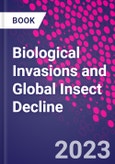Biological Invasions and Global Insect Decline offers the most updated knowledge on how invasive alien species affect insect diversity worldwide. The book provides ongoing research and the most relevant information, covering the main aspects of the impact of biological invasions as well as future insights on mitigation and consequences. It discusses how the introduction of all kinds of organisms, from bacteria and plants to vertebrates, affect current declines in insect diversity. The latter portion of the book delves into existent and future monitoring and management programs, including citizen science and regenerative ecology as socio-ecological solutions to combat these threats.
Written and edited by international experts on invasion ecology and insect conservation, this book explores the role of global change and the introduction of invasive species in altering the structure of habitats and how this induces a global insect decline. This will be a valuable resource for entomologists, invasion biologists and other researchers in biodiversity conservation, as well as practitioners and stakeholders concerned about problematic invasive alien species and insect population decline.
Please Note: This is an On Demand product, delivery may take up to 11 working days after payment has been received.








